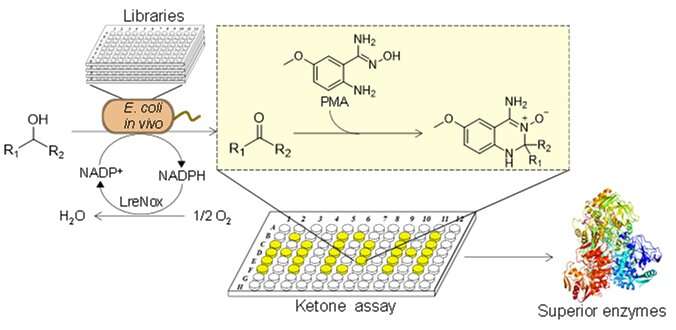Flow chart of PMA-ketone fluorescence screening. Credit: Prof. SUN Zhoutong's group
Ketones are of great importance as building blocks in synthetic organic chemistry and biocatalysis. Most ketones cannot easily be quantitatively assayed due to the lack of visible photometric properties. Effective high-throughput assay (HTA) development is therefore necessary for ketone determination.
Prof. Sun Zhoutong's group from the Tianjin Institute of Industrial Biology of the Chinese Academy of Sciences has developed a colorimetric method for rapidly detecting structurally diverse ketones by using paramethoxy-2-amino benzamidoxime (PMA) as a chemical probe.
The PMA-based system allows fluorescence screening that is quite sensitive (up to μM range), compatible with aqueous systems and broad a pH range. Various ketones can be used, especially those with electron-rich and sterically small substituents. The easy-to-operate assay can be conducted in a 96-well plate format at room temperature with normal laboratory equipment.
Furthermore, the developed high-throughput assay (HTA) was successfully employed in the mining-based discovery of enzymes with increased oxidation activity toward secondary alcohols and in directed evolution of an alcohol dehydrogenase aimed at enhancing the catalytic activity using ketones as substrates or products.
This work provides a general tool for ketone detection in biocatalyst development.
The study, titled "A High-Throughput Fluorescence Assay for Ketone Detection and its Applications in Enzyme Mining and Protein Engineering," has been published in ACS Omega.
More information: Zelong Mei et al. High-Throughput Fluorescence Assay for Ketone Detection and Its Applications in Enzyme Mining and Protein Engineering, ACS Omega (2020). DOI: 10.1021/acsomega.0c00245
Journal information: ACS Omega
Provided by Chinese Academy of Sciences
























